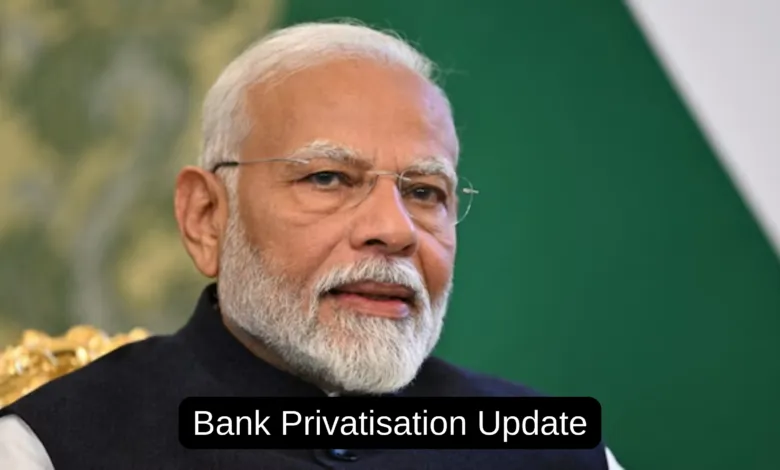Govt has put Bank Privatisation Proposal on Hold

As per the sources, the central government has put on hold its plan to privatise two public-sector banks (PSBs). Recently, the Government of India had announced to privatise some public sector banks. But now the plan has been postponed as the PSU Banks are now profitable and have reported a robust performance. The main reasons for the postponement of Bank Privatisation are – Strong Protest from Bank Unions and Public Trust in PSU Banks.
In recent years, PSBs have reported strong financial growth, even outperforming some private banks. Their combined net profit surged to ₹1.41 lakh crore in 2023-24, up from ₹1.05 lakh crore in 2022-23.
Experts had anticipated that the government would proceed with privatisation process of PSU Banks after the completion of the general elections in May 2024. But this did not happen. Finance Minister Nirmala Sitharaman had initially announced plans to privatise two PSBs in the Union Budget for 2021-22, aligning with the new Public Sector Enterprise (PSE) policy, which aimed to limit the number of public-sector players in strategic sectors to four. The decision was also intended to boost competition in the banking sector and drive overall growth.
However, the government has yet to finalise the necessary amendments to key laws, including the Banking Companies (Acquisition and Transfer of Undertakings) Acts of 1970 and 1980 and the Banking Regulation Act of 1949, which are required to facilitate privatisation.
Why is the Government not privatizing PSU Banks?
It’s not so easy for the Government to privatize PSU Banks. These are very big banks and are crucial for the growth of the Indian Economy. Moreover, people trust public-sector banks in India. After the failure of YES Bank and recent negative news about IndusInd Bank, there might be a change in the thinking of the government and senior officials. Through the public sector banks, the government has direct control over various parameters of the economy. Moreover, the government has connected the common public with these public sector banks via various government-sponsored schemes. Private Sector Banks focus mainly on generating profit and there is also fear that these banks might not pay so much interest in promoting government schemes.
Apart from this, the privatization proposal has faced strong opposition from bank unions and employees. Unions argue that PSU Banks play a crucial role in nation-building by channeling public savings into priority sectors such as agriculture. These banks are the reason behind the rapid economic development of India. Bank Unions have threatened strikes against privatization. This ongoing resistance is seen as a key reason behind the government’s hesitation to move forward with its privatisation plans.
IDBI Bank Privatisation
The privatisation of IDBI Bank remains a contentious issue. There are reports that the privatisation of IDBI Bank is under process. According to DIPAM Secretary Arunish Chawla, the divestment process is expected to be completed within three months. Meanwhile, the employees are protesting against this privatisation. MP Supriya Sule has opposed further divestment, arguing that the bank is profitable. Leader of Opposition Rahul Gandhi recently met with IDBI employees to discuss their concerns. The government and LIC are jointly selling a 61% stake in IDBI Bank, with the Centre holding 30.48% and LIC 30.24%.
